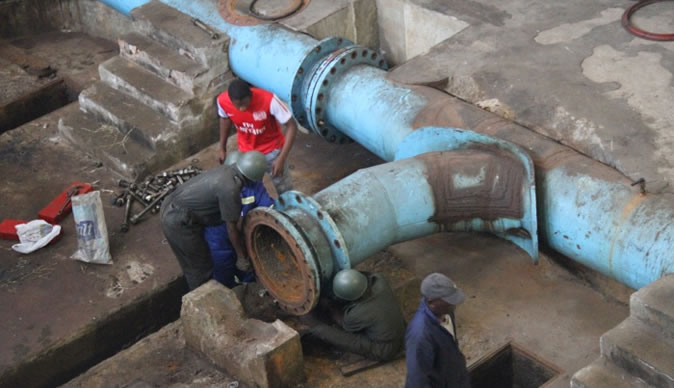
Harare City Council has been struggling to supply residents with clean water for over a decade now and the crisis got worse last week when the local authority began a six-month long rehabilitation of its main water works.
STANDARD COMMENT
Council last week said residents would experience water shortages mostly on weekends until July as it begins the refurbishment of equipment at the Morton Jaffray plant.

Water cuts would be experienced in most parts of Harare, Norton, Ruwa, Epworth and Chitungwiza.
Council is using a $144 million loan from China to replace machinery that was commissioned as far back as 1953.
The local authority hopes after the refurbishment, the Morton Jaffray plant’s capacity would increase to 614 megalitres of purified water a day.
Such developments would be welcomed by residents of some of Harare’s suburbs that have gone for over 10 years without running water due to the council’s lack of capacity to supply them with the precious liquid.
- Chamisa under fire over US$120K donation
- Mavhunga puts DeMbare into Chibuku quarterfinals
- Pension funds bet on Cabora Bassa oilfields
- Councils defy govt fire tender directive
Keep Reading
Harare has witnessed frequent outbreaks of water-borne diseases such as cholera and typhoid because of the poor water supplies. A fresh typhoid outbreak has hit Kuwadzana, Warren Park, Kambuzuma and Dzivarasekwa suburbs amid reports that up to 800 cases have been recorded to date.
In 2008, one of the worst cholera outbreaks ever recorded in this country left tens of Harare residents dead and thousands infected. These outbreaks have been blamed on irregular water supplies, especially in the high-density suburbs and on burst sewer pipes that have become a common phenomenon in the capital.
Ideally, Harare should not be suffering from such disease outbreaks because it is supposed to be a world class city, but alas ratepayers are subjected to the worst imaginable living conditions where running water has become a luxury.
Therefore, the ongoing rehabilitation work of council water works raises hopes that the city’s ability to distribute treated water will be enhanced.
Council has also been grappling with issues of poor water quality, which is another reason for the disease outbreaks, and it is hoped that the repairs will address such problems once and for all.
Meanwhile, the city’s poor will be forced to dig deeper into their pockets to buy water during the disruptions.
The government and council must come up with measures to alleviate people’s plight during this exercise by availing water bowsers in the most affected suburbs.
Provision of water bowsers would mainly be welcome in places most affected by the current typhoid outbreak and this should be done as a matter of urgency.
Council should also avail adequate information on the scheduled water cuts to enable residents to plan accordingly.
Already, there are concerns that some of the water cuts are done haphazardly, leaving residents without any sources of drinking water.
This cannot be allowed in a city that is fighting a typhoid outbreak and is also in the throes of a serious drought that has seen most underground water sources being depleted.
It can certainly not be business as usual for the city council as it needs to be proactive in handling the water crisis.
Council has to consider other innovative ways of fast-tracking the repairs at Motton Jaffray as Harare is too fragile to afford six months of intermittent water supplies.











